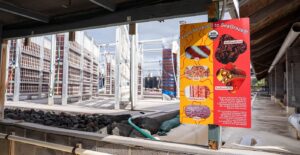As we look ahead to the Forbes AgTech Summit later this week, we took a moment to reflect on GAI’s AgTech Week, which took place two weeks ago in San Francisco, to make a few observations on what’s happening in agtech.
Some of the world’s best minds, hailing from sectors like biotech, finance, agronomy, academics, tech, and computer science, met for the inaugural GAI AgTech Week. The event consisted of 2.5 days of panels, think tanks, speakers, and networking opportunities designed to educate and inspire investors and entrepreneurs with a broad range of investment opportunities and insight into the food and agriculture technology sectors worldwide.
Since 2009, GAI has hosted a number of agricultural investing conferences around the world, including New York, Geneva, Singapore, Abu Dhabi, London, and Dubai. The inaugural San Francisco conference, focused exclusively on agtech, recognizes the growing importance of Silicon Valley and California’s Central Valley in developing the next wave of innovation.
Here are some observations that stood out from the conference:
1. New investor faces
The agriculture investing world has been a tight knit community; the same faces have shown up regularly at industry events. However, this event brought in brand new faces. Just look at the attendee list, and you’re seeing a wide range of new investors participating from pension plans to tech investors. Moreover, many new VC funds have been raised that are dedicate to food and agriculture.
2. Growing diversity among key agricultural players
As an increasing amount of attention is drawn toward agtech, more and more companies are beginning to categorize themselves as part of the space. Attendees at the company included a diverse range of entrepreneurs and companies, from food tech company Hampton Creek to global imaging network provider Planet Labs. Food entrepreneurs in particular presented an array of new products and innovations.
3. Investors hoping for more soil health and seed treatment deals
From our conversations, one theme stood out when it came to investors’ priorities: soil health. Many conference attendees from the finance world noted that this sub-sector is currently underinvested and that they have earmarked it for growth in coming years. Seed treatment is another huge area with all the majors looking at. Technological advances in soil inputs can lead to yield enhancement, an increased uptake of nutrients, drought tolerance, and improved overall crop health.
4. Institutional investors looking for ways to amplify their portfolio
As we heard from Mitchell Presser, Head of U.S. Mergers and Acquisitions for Freshfields Bruckhaus Deringer, private equity investors are taking a deeper look at opportunities in this space. Presser led an interactive think tank on achieving the transition from venture to growth capital, and highlighted the growing connection between these two funding sources. Furthermore, private equity, family offices, and even large pension funds that have investment exposure downstream from agriculture production are beginning to look across the entire value chain to understand how technology could impact their existing investments.
5. Government support for innovation in the sector and partnerships with private sector
Providing a keynote address on the final day of the conference, U.S. Secretary of Agriculture Tom Vilsack discussed the growing role for the government to play in this sector. In his speech, Vilsack referenced key government policy shifts, including moving many of the U.S. Navy’s vessels to biofuels and investigating the potential for space farming on Mars. Many other public entities were in attendance at the event, including the USDA’s Economic Research Service and National Institute of Food & Agriculture, and the California State Water Resources Control Board.
According to Vilsack, the government will likely be allocating a larger chunk of funds towards agtech in both the public and private sectors. Included in the 2002 Farm Bill package, the Rural Business Investment Program has created two new Rural Business Investment Companies (RBIC). for example, is designed to promote developmental venture capital investments in smaller enterprises located in rural areas.
A number of venture capital groups have been licensed under the program, including Innova Memphis and Meritus Kirchner Capital. Meritus has set a goal of raising $100 million, while Innova will allocate over $25 million. Once the funds have been raised, these companies will make equity investments in rural businesses with high-growth potential.
Vilsack’s message during his keynote address was very clear: “I am here to make the case that there is endless opportunity in agriculture.”
We’ll be reporting from the Forbes AgTech Summit later this week, so look for more real-time sector highlights.
Have news or tips? Email [email protected].




